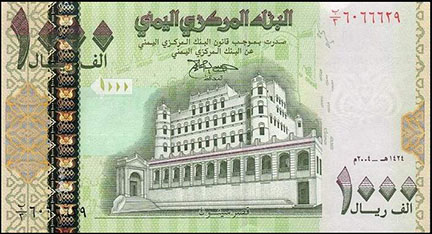
Michel Foucault, the French philosopher/historian, is oft quoted for equating knowledge (savoir) with power (pouvoir). Thanks to investigative reporting by Yemeni journalists, we now have knowledge about how Ali Abdullah Salih, the former President of Yemen, used his power to create riyal-ity, that is fabulous wealth skimmed off Yemen’s oil revenues in riyals. As reported in Yemen Press, Salih funneled millions of his wealth to the United Arab Emirates, also having villas built for his family. He has also distributed his vast wealth, as yet unaccounted for, to Morocco, France, Germany and Italy. It is reported that he did not use his own name, but those of family members.
So what else is new? Dictators, like kings and sultans of the past, have always enriched themselves while poor people starved on the streets. The more power tends to be absolute,or near absolute, the more the coffers get filled. Mamluk sultans in Egypt would periodically sack wealthy officials or merchants just to absorb their wealth. While most contemporary states have safeguards to prevent wholesale laundering of a country’s wealth, dictators generally define their own rules. While Asad hangs on to power in embattled Syria, there are no doubt several bank accounts full of cash if he ends up being forced out.
While it is true that there are various kinds of power, positive as well as negative, economics trumps the abstract notion of knowledge. Greed explains more than prejudice, although the two generally go hand in hand. Yemen is a special case in the seasonal shift following the Arab Spring. Salih was granted immunity in a deal brokered by the GCC and allowed to remain in Yemen, where he still has a cadre of loyal supporters. He has been accused of trying to sabotage the fragile National Dialogue Conference, so he is hardly retired and sitting out his days writing an autobiography.
Although there is no “civil war” in the strict sense, there is certainly civil strife. The Huthis in the north battle against the Salafis with the region around Sa’da devastated, houses destroyed and agriculture ruined. The southern secessionist movement is directly related to Salih’s hegemonic dismantling of the south after unification in 1990. The recent flare-ups in Hadramawt, including the killing of soldiers, continues. An imported AQAP is taking advantage of the insecurity to wreak havoc in the south and focusing their terrorist acts on Yemen itself. Every day members of Yemen’s military or police are killed.
And so, the dance goes on: dancing not just on the heads of snakes but dancing as partners with snakes. Yemen needs a snake charmer, someone whose voice of tolerance can tame the poison currently pitting Yemenis against each other. That voice is not Salih’s and it does not appear that President Hadi has the support to create harmony among the various factions. One thing is certain: the wealth differential in a country were poverty is endemic is the most enduring poison. Who has the antidote?